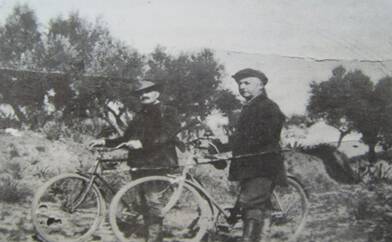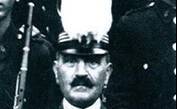Gioconto Moretti
The chief musician Giocondo Moretti was born in 1867 in the small town of Pozzuolo, near Perugia, Italy, having noble parents who gave him a high education, especially in music. There are various versions of how he settled in Gythio. Some argue that he came as a guest of the Greek government to inaugurate the 1896 Olympiad with his music or that he came intending to become a conductor in the band of the Patra Italian parish, eventually ending up in Gythio. According to another version, the leading cause was a love accident (it is said that Moretti's fiancée at the time died in his arms), leading him to "self-exile" in Gythio.
Giocondo Moretti was more than just a musician who took over Gythio's band. He was a man of morals and courage, so he faced the suspicion of the closed conservative society of the small town, whose inhabitants had little to do with music (except for financially powerful families). He permanently settled in Gythio in 1897, at the age of 30, where he married Dimitra Vouzounara (Kokkinaki), with whom he had a daughter, Tzelina (who learned to play the piano while growing up). Moretti had brought a grand piano and thirty other musical instruments and set up a Conservatory on the first floor of his house (opposite the church of Agios Georgios), having envisioned Gythio’s first band.
In 1900, Moretti had managed to gather students and musicians among cobblers, boatmen and small professionals. Through time, there was high demand for Gythio’s band in the broader area. It is characteristic that, during the pre-war period, all houses in Gythio had at least one person involved in music playing some instrument (mainly the mandolin, the flute, the violin, the guitar or the piano). After 1920, Giocondo Moretti's band flourished, and a Mandolinata band (mandolin ensemble) was created. Every summer, on Sundays at midnight, Moretti had established to go out with his band to the central square of Gythio and play music. It was the well-known "Mezzanotte", which in Italian means "midnight", and made the picturesque alleys of Gythio flood with smiling faces.
In 1925, the "Krokees Association " was founded in Krokees (Levetsova) with the aim of creating a philharmonic brass band. Giocondo Moretti took over as chief musician from 1926 to 1930 (along with Gythio). In fact, he made the Gythio-Krokees-Gythio route riding his bicycle three times a week (covering a distance of 40 kilometres).
The main personal instrument of the chief musician was the wind oboe and the clarinet, which he played only in rehearsals and never in public. Giocondo Moretti always remained a conductor dressed in the characteristic uniform and plume. He always remained faithful to his ideals and the place that raised him and never left Gythio to take over a band with a broader range and audience, such as the Athenian one.
In August 1940, a big evening dedicated to Moretti’s 40 years of contribution, who was 73 years old at the time, was held in Gythio. With the declaration of the Greco-Italian war, he joined a concentration camp in Athens, and in the summer of 1941, he ended up in Sparta, where his son-in-law, Antonis Zervobeakos, lived. In July of the same year, Moretti went to the cemetery of Sparta, where he committed suicide by cutting his veins, possibly to avoid watching his son’s-in-law execution by the Germans at Monodendri.
Sources:
- Nikos Panagopoulos, "The pre-war Gythio", Athens, 1993.
- https://www.vasilis67.wordpress.com (Vasilis Poulimenakos)





